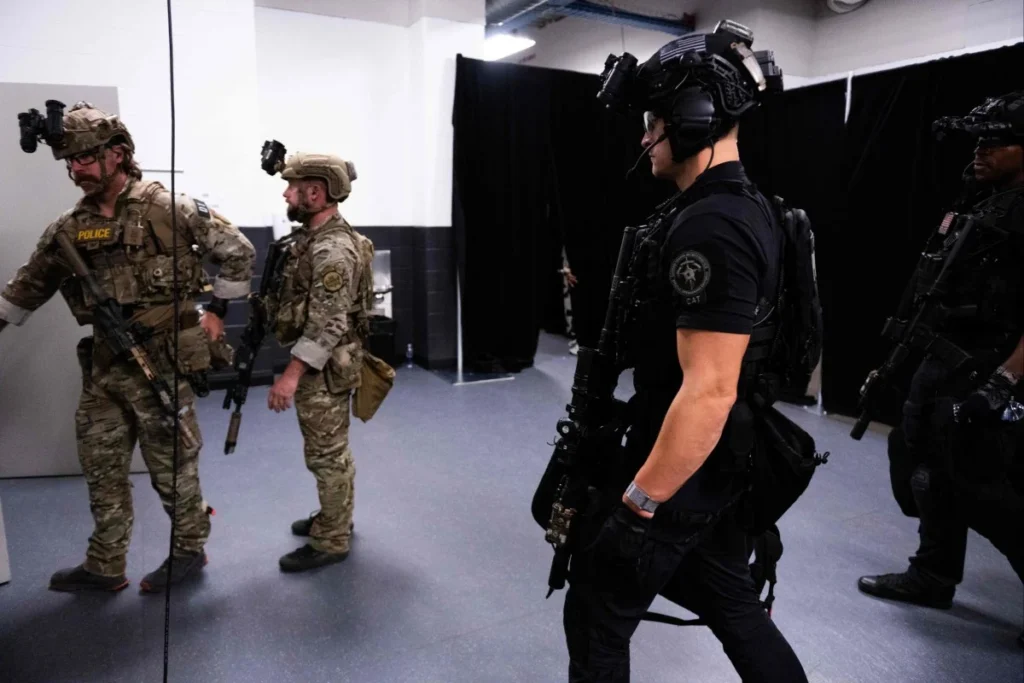
Election interference threats are a top concern as the U.S. nears Election Day, and the FBI has taken significant steps to safeguard the electoral process. With the stakes high in 2024, the FBI has established a dedicated nerve center to monitor potential threats to election infrastructure and ensure the integrity of the vote. Amid concerns of foreign influence, cyberattacks, and misinformation, authorities are on heightened alert for any interference that could undermine public trust in the democratic process.
The Rising Concern of Election Interference Threats
As elections approach, concerns around election interference threats have intensified. The FBI, along with other federal agencies, is actively monitoring potential risks from various sources, including foreign state actors, domestic groups, and lone individuals. From cyberattacks targeting voting systems to disinformation campaigns aimed at influencing voter perception, these threats underscore the vulnerability of modern election infrastructure. Over recent years, authorities have observed an increase in both the sophistication and scope of these potential threats, making election security a priority in 2024.
According to officials, a key focus of the FBI’s efforts this election cycle involves collaboration with the Cybersecurity and Infrastructure Security Agency (CISA), which oversees critical infrastructure protection. By working together, the agencies aim to detect and respond quickly to any threats that could interfere with voting technology, ballot counting, or public trust in election outcomes.
FBI’s Election Threats Nerve Center
To address election interference threats, the FBI established a central hub where agents, analysts, and cybersecurity experts can coordinate in real time. This facility, often referred to as the “nerve center,” provides a streamlined space where federal agencies can work with local and state officials to track, assess, and mitigate any potential risks as they arise. In previous election cycles, similar operations have helped authorities respond quickly to attempted breaches and disinformation campaigns, providing voters with timely and accurate information.
The nerve center, located at FBI headquarters in Washington, D.C., is equipped with advanced technology for monitoring cyber threats. Officials have reported heightened efforts to track foreign state actors, such as Russia and Iran, who have historically been linked to election interference in the U.S. These monitoring efforts involve tracking communications, identifying suspicious activity in state systems, and working closely with social media platforms to curb the spread of misinformation.
“We want Americans to feel confident that their votes will be counted accurately and that our democracy remains secure,” said an FBI official involved in the initiative. By creating this nerve center, authorities aim to address threats promptly, especially as misinformation spreads quickly on social media platforms.
Types of Election Interference Threats Monitored
The types of election interference threats monitored by the FBI are diverse, ranging from cyberattacks on state infrastructure to foreign-led disinformation campaigns. Some of the primary threats include:
- Cyberattacks on Voting Systems: Hackers may attempt to breach voting systems or voter databases to alter results or create confusion. The FBI works closely with state election offices to enhance their defenses against such breaches.
- Disinformation Campaigns: Foreign actors have been known to use social media to disseminate false information aimed at influencing voter opinions and turnout.
- Intimidation and Physical Threats: FBI monitoring also includes physical security at polling stations to ensure voters feel safe while casting their ballots.
These threats can disrupt voting processes, discourage voter turnout, and diminish public trust. To counter these risks, the FBI has improved its collaboration with technology companies and media platforms to detect and limit the spread of misleading information, especially as Election Day nears.
Role of Technology in Countering Election Interference Threats
Technology plays a pivotal role in monitoring and countering election interference threats. Advanced tools allow the FBI and CISA to conduct real-time analysis of suspicious activities, monitor open-source intelligence, and receive alerts from artificial intelligence-driven systems designed to flag unusual patterns.
The FBI’s nerve center relies on several layers of technology, including:
- Data Analytics: Helps in tracking irregularities across multiple systems and assessing the severity of any detected interference.
- Machine Learning Algorithms: Used to detect and predict misinformation patterns that could influence public opinion.
- Cybersecurity Firewalls: Strengthen election databases and voting infrastructure against unauthorized access attempts.
These technological advancements enable quicker identification and neutralization of potential threats, significantly reducing their impact on election results.
Public Awareness and Media’s Role in Election Security
Public awareness is another critical component in managing election interference threats. By working with media outlets, the FBI provides verified updates and fact-checks on election security to help the public distinguish between credible and misleading information. In recent years, social media has become a platform where disinformation spreads rapidly, and both government agencies and social platforms are working to combat this by providing voters with accurate, verified information.
Several media organizations have also stepped up efforts to counter misinformation by establishing fact-checking teams. These teams work with federal agencies to verify information related to election security, polling locations, and voting procedures. Social media platforms, including Meta, X (formerly Twitter), and YouTube, are partnering with the FBI to remove posts that could mislead voters.
Public Confidence and the Path Forward
Maintaining public trust is essential in the face of election interference threats. The FBI’s nerve center represents a proactive approach to election security, ensuring voters can have confidence in the integrity of their vote. By securing voting infrastructure, monitoring disinformation, and providing real-time updates, the FBI and its partners are setting a standard for election security that aims to safeguard the democratic process.
With the support of technology, interagency collaboration, and public awareness campaigns, authorities are better equipped than ever to mitigate election interference. However, as these threats evolve, the FBI will continue to adapt its strategies to stay ahead, securing future elections and maintaining the public’s trust in American democracy.
The FBI’s heightened vigilance this election season serves as a reminder of the ever-present risks facing U.S. elections. As officials work to counter these election interference threats, voters are encouraged to seek information from reliable sources and remain vigilant against misinformation, ensuring that their voices are accurately represented in the electoral process.
image credit – AFP


